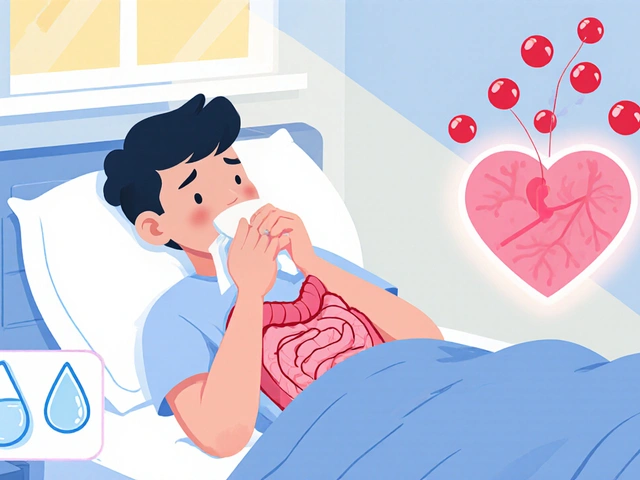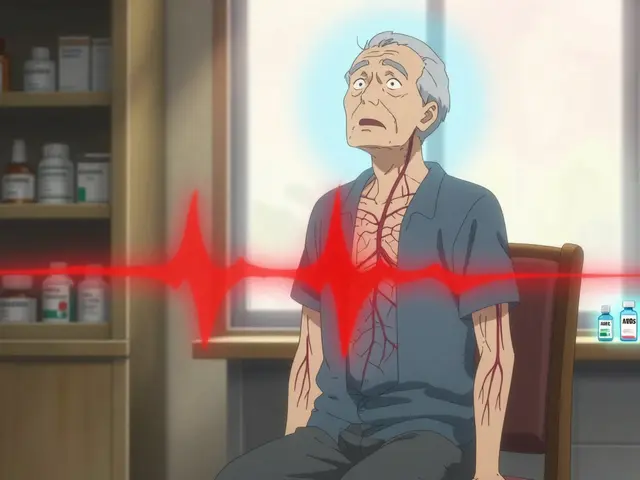Gastroenteritis Heart Risk Calculator
Personal Assessment
This tool helps determine your heart risk level during gastroenteritis based on your symptoms, hydration, and electrolyte status. Based on your inputs, you'll receive personalized guidance on next steps.
Heart Risk Assessment
Every year, millions of Australians contract Gastroenteritis an inflammation of the stomach and intestines usually caused by viruses, bacteria, or parasites. While most think of stomach cramps and loose stools, fewer know that the illness can strain the heart, especially when dehydration and electrolyte shifts come into play. If you’ve ever felt a racing heartbeat during a bout of the stomach flu, you’re not imagining it - your body is literally pulling an emergency response that can affect your cardiovascular system.
Key Takeaways
- Severe dehydration from gastroenteritis can trigger irregular heartbeats and low blood pressure.
- Electrolyte imbalances, especially low potassium or magnesium, raise the risk of arrhythmias.
- Inflammatory responses may worsen existing heart disease and, in rare cases, lead to heart inflammation (myocarditis).
- Prompt fluid replacement, monitoring symptoms, and seeking medical help when warning signs appear protect both gut and heart.
- Healthy lifestyle habits-balanced nutrition, steady hydration, and gradual return to activity-speed recovery and reduce cardiac stress.
Why Gastroenteritis Can Reach the Heart
The gut and the heart share a two‑way street of signals. When the stomach lining is inflamed, the body releases cytokines-proteins that coordinate inflammation. Those cytokines don’t stay local; they travel through the bloodstream and can affect the Heart the muscular organ that pumps blood throughout the body by increasing heart rate and raising blood pressure.
At the same time, vomiting and diarrhoea strip the body of water and vital salts. Dehydration a condition where the body loses more fluids than it takes in reduces blood volume, causing the heart to work harder to circulate the same amount of blood. The combination of inflammatory signals and low circulating volume sets the stage for cardiac complications.
Major Cardiac Complications
Not every case of gastroenteritis leads to heart trouble, but these are the most common pathways doctors watch for:
| Complication | How it arises | Warning signs | Typical severity |
|---|---|---|---|
| Dehydration‑induced low blood pressure | Fluid loss lowers circulating volume, dropping systolic pressure. | Dizziness, fainting, rapid but weak pulse. | Moderate - reversible with rehydration. |
| Electrolyte imbalance | Loss of potassium, magnesium, and sodium through stool/vomit. | Palpitations, muscle cramps, irregular heartbeat. | Variable - can trigger serious arrhythmias. |
| Inflammatory myocarditis | Cytokine surge inflames heart muscle tissue. | Chest pain, shortness of breath, persistent fatigue. | Rare but potentially life‑threatening. |
| Septic shock (advanced infection) | Severe bacterial gastroenteritis releases toxins that cause systemic infection. | High fever, cold clammy skin, confused state. | Critical - requires emergency care. |
Who’s Most at Risk?
Anyone can develop gastroenteritis, but certain groups face a higher chance of heart‑related fallout:
- Older adults - reduced kidney function makes fluid loss more dangerous.
- People with pre‑existing heart disease - their hearts are already working close to capacity.
- Children under five - tiny bodies dehydrate quickly.
- Athletes or highly active individuals - increased sweating compounds fluid loss.
If you fall into any of these categories, keep a closer eye on blood pressure, pulse, and any tingling or chest discomfort that doesn’t fade after a few hours.
Managing Symptoms and Shielding Your Heart
Here’s a step‑by‑step plan that balances gut recovery with cardiac safety:
- Start gentle rehydration immediately. Sip oral rehydration solutions (ORS) or a homemade mix of 1L water, 6tsp sugar, and ½tsp salt. The goal is 200-250ml per hour.
- Electrolyte monitoring checking levels of potassium, sodium, and magnesium to prevent arrhythmias. If you’re vomiting repeatedly, consider a sports drink that includes potassium and magnesium, or ask a GP for a quick blood test.
- Keep a symptom diary. Log temperature, stool frequency, fluid intake, and heart rate (a simple fingertip pulse timer works). Patterns help doctors decide if you need IV therapy.
- If dizziness, fainting, or a racing heart persists after two hours of oral rehydration, seek medical care. IV therapy intravenous fluid replacement that quickly restores volume and electrolytes may be required.
- Avoid caffeine and alcohol until fully recovered; both can worsen dehydration and trigger heart rhythm changes.
- Rest. Physical exertion spikes heart rate and can lead to a harmful feedback loop when you’re already fluid‑deficient.
Nutrition and Lifestyle Tips for a Smooth Recovery
Food can be a powerful ally. Choose bland, easy‑to‑digest options that also help replace lost salts:
- Bananas - rich in potassium.
- Plain yogurt - provides probiotics and calcium.
- Rice or toast - gentle on the stomach and adds simple carbs.
- Broth‑based soups - hydrate and supply sodium.
Gradually re‑introduce fiber after the first 48hours; sudden fiber can cause gas and more cramps, putting extra pressure on the diaphragm and heart.
When you feel back to normal, re‑start light activity-short walks, gentle stretching-rather than jumping straight into high‑intensity workouts. This lets the heart adjust to normal blood volume again.

When to Call a Doctor
The line between a mild stomach bug and a heart emergency can be thin. Call emergency services (000 in Australia) if you notice any of these red flags:
- Chest pain that radiates to the arm or jaw.
- Severe shortness of breath at rest.
- Rapid heart rate (>120bpm) that doesn’t settle after fluids.
- Persistent high fever (>39.5°C) with shaking chills.
- Signs of severe dehydration: dry mouth, no urination for 8hours, sunken eyes.
Early intervention can prevent a temporary rhythm issue from becoming a lasting heart condition.
Quick Checklist for Home Care
- Keep a bottle of ORS or a ready‑made electrolyte drink on the fridge.
- Measure fluid intake; aim for at least 2L per day if you have diarrhea.
- Monitor heart rate three times a day; write it down.
- Have a thermometer (preferably digital) handy.
- Know the nearest urgent care centre and its opening hours.
Frequently Asked Questions
Can gastroenteritis cause a heart attack?
A direct heart attack from gastroenteritis is rare. However, severe dehydration and electrolyte shifts can trigger angina (chest pain) in people with existing coronary artery disease, which may be mistaken for a heart attack. If you have known heart disease, treat any bout of gastroenteritis as a potential cardiac stressor and seek medical advice early.
Why does my heart race when I’m vomiting?
Vomiting forces rapid breathing and can cause a temporary drop in blood pressure. Your body reacts by releasing adrenaline, which speeds up the heart. This is a normal stress response, but if the racing persists for more than a couple of hours, rehydrate and consider a check‑up.
Is it safe to take over‑the‑counter anti‑diarrheal meds?
For most viral gastroenteritis cases, stopping diarrhea isn’t necessary and may prolong the infection. If you have a heart condition, avoid meds that slow gut motility because they can increase fluid loss and stress the heart. Always check with a pharmacist or doctor first.
How long should I wait before exercising again?
Wait at least 48hours after the last watery stool and once you’re drinking fluids without difficulty. Start with light walking and monitor how your heartbeat feels. If you notice any palpitations, pause and re‑assess your hydration and electrolyte status.
Can probiotics help prevent heart issues during gastroenteritis?
Probiotics can shorten the duration of some bacterial infections, which means less fluid loss overall. While they don’t directly protect the heart, reducing the severity of the gut illness indirectly lowers cardiac stress. Choose a reputable strain‑specific product and start it after the acute phase.








Comments
Let’s cut the fluff and get straight to the metabolic cascade: gastroenteritis precipitates hypovolemia, which triggers sympathetic overdrive, elevating catecholamine levels and predisposing to arrhythmogenic substrates. Your simplistic “drink water” advice ignores the quantifiable electrolyte deficit-specifically, the serum potassium nadir that can destabilize myocardial repolarization. Moreover, the cytokine storm you gloss over is a bona fide pro‑inflammatory mediator for myocarditis. In short, without rigorous isotonic fluid resuscitation protocols, patients are flirting with cardiac decompensation.
Oh my gosh, this is like a medical thriller and you just dropped the mic! I’m totally blown away by how you wrote about the heart‑gut connection-sooo intense!! But, like, maybe don’t forget to tell folks to chill and not freak out too much, ya know??
While the enthusiasm is palpable, one must acknowledge the epistemological oversight inherent in conflating symptomatic tachycardia with pathological arrhythmias. A discerning clinician would delineate benign autonomic responses from genuine electrophysiological perturbations, thereby avoiding alarmist hyperbole. In essence, the discourse could benefit from a more rigorous stratification of hemodynamic metrics.
When we contemplate the interplay between the gastrointestinal tract and the cardiovascular system, we are reminded that the body operates as an integrated ecosystem rather than a collection of isolated organs. Dehydration, for instance, is not merely a loss of water; it is a reduction in plasma volume that forces the heart to compensate by increasing stroke volume and heart rate, a compensatory mechanism that can become maladaptive if sustained. The cytokine surge associated with gastroenteritis illustrates how immune signaling extends its reach beyond the gut mucosa, influencing myocardial inflammation in subtle yet consequential ways. Moreover, electrolyte disturbances-particularly hypokalemia and hypomagnesemia-affect the cardiac action potential, lowering the threshold for ectopic beats and potentially precipitating life‑threatening arrhythmias.
From a clinical perspective, the importance of vigilant monitoring cannot be overstated. Simple bedside measurements, such as orthostatic blood pressure and pulse palpation, can uncover early signs of hemodynamic instability before catastrophic collapse ensues. Simultaneously, laboratory assessment of serum electrolytes provides quantitative data to guide targeted repletion, thereby mitigating the risk of rhythm disturbances. The role of oral rehydration solutions, which contain balanced sodium and glucose concentrations, transcends mere fluid replacement; they facilitate intestinal absorption via the sodium‑glucose cotransporter, expediting restoration of intravascular volume.
Philosophically, we might view each episode of gastroenteritis as a stress test for the cardiovascular system, offering an opportunity to observe resilience and vulnerability within the same physiological framework. In older adults, where renal concentrating ability wanes, even modest fluid loss can precipitate profound hypotension, underscoring the need for proactive hydration strategies. For athletes, the heightened sweat rate amplifies the challenge, demanding a disciplined approach to electrolyte supplementation.
Ultimately, the convergence of gut pathology and cardiac risk reinforces a central tenet of medicine: holistic patient care demands attention to the cascade of downstream effects that originate from a seemingly localized insult. By embracing comprehensive monitoring, timely intervention, and patient education, we can safeguard both the stomach and the heart, turning a potentially perilous episode into a manageable, recoverable event.
Stop overthinking it, just hydrate.
First off the fluid balance equation is non‑negotiable; you need isotonic solutions ASAP the sodium‑glucose co‑transport mechanism is your friend however neglecting potassium replacement jeopardizes the cardiac action potential leading to ectopic foci you cannot afford to ignore also monitor serum osmolality regularly to avoid hyponatremic complications
For adults, aim for 2‑3 L of oral rehydration solution per day if diarrhea persists, ensuring the solution contains approximately 75 mmol/L of sodium and 20 mmol/L of potassium to maintain electrolyte homeostasis.
Oh great, another post telling us to “just drink water” while the heart is apparently about to quit the job. Because we all know a simple glass magically stabilizes complex electrolyte dynamics, right?
Dear readers, the clinical management of gastroenteritis must be approached with a rigor commensurate with its potential systemic sequelae. While the primary focus often lies on gastrointestinal symptomatology, the attendant hemodynamic perturbations warrant equal consideration. Dehydration reduces preload, prompting compensatory tachycardia; if uncorrected, this state can culminate in orthostatic hypotension and reduced coronary perfusion. Furthermore, the loss of potassium, magnesium, and sodium disrupts the electrophysiological stability of myocardial cells, predisposing patients to arrhythmic events such as premature ventricular contractions or, in severe cases, ventricular tachycardia.
Evidence‑based guidelines recommend the early initiation of oral rehydration therapy containing a precise sodium‑glucose ratio of 1:1, which exploits the sodium‑dependent glucose cotransporter to enhance fluid absorption. In patients exhibiting persistent vomiting, or in those with significant electrolyte derangements, intravenous isotonic crystalloid solutions, such as lactated Ringer’s or normal saline, should be administered under close monitoring of serum electrolytes. Moreover, serial assessment of vital signs-including heart rate, blood pressure, and capillary refill-provides real‑time insight into circulatory adequacy.
From a preventative standpoint, educating patients about the signs of hypovolemia-such as dry mucous membranes, diminished urine output, and postural dizziness-empowers them to seek timely medical attention. Additionally, individuals with pre‑existing cardiac conditions should be counseled to maintain an elevated fluid intake threshold during gastrointestinal illnesses to offset the added cardiac workload.
In conclusion, the intersection of gastroenteritis and cardiac health exemplifies the necessity for an integrated therapeutic strategy. By adhering to evidence‑based rehydration protocols, conducting diligent electrolyte surveillance, and fostering patient awareness, clinicians can mitigate the risk of cardiac complications and promote a swift, uncomplicated recovery.
Haha, love the drama 😂 but seriously, staying hydrated isn’t just a meme, it actually saves lives 💧💓. If you feel dizzy or your heart’s racing, don’t wait-call a doc 📞. Keep an ORS bottle handy, it’s a lifesaver 🧂🍯. Stay safe and sip smart! 🌟
Great job on covering all the bases! Remember, staying positive and listening to your body’s signals makes the recovery journey a lot smoother. You’ve got this-keep up the good work and don’t forget to celebrate small victories along the way.